The HP S700 And S700 Pro SSD Review
by Billy Tallis on September 7, 2017 9:00 AM ESTAnandTech Storage Bench - Light
Our Light storage test has relatively more sequential accesses and lower queue depths than The Destroyer or the Heavy test, and it's by far the shortest test overall. It's based largely on applications that aren't highly dependent on storage performance, so this is a test more of application launch times and file load times. This test can be seen as the sum of all the little delays in daily usage, but with the idle times trimmed to 25ms it takes less than half an hour to run. Details of the Light test can be found here. As with the ATSB Heavy test, this test is run with the drive both freshly erased and empty, and after filling the drive with sequential writes.
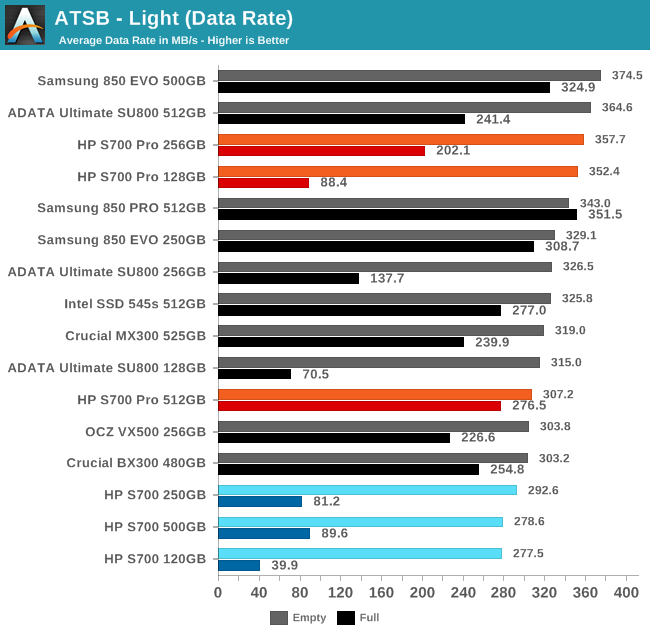
On our lightest ATSB test, the average data rate scores are not as widely variable and higher capacity doesn't always translate to a clearly higher score. The empty-drive performance of the HP S700 is slower than everything else regardless of capacity, but not by a huge margin. When the drives are full, the HP S700's performance drops precipitously, but the 512GB HP S700 Pro retains more performance than even Crucial's drives.
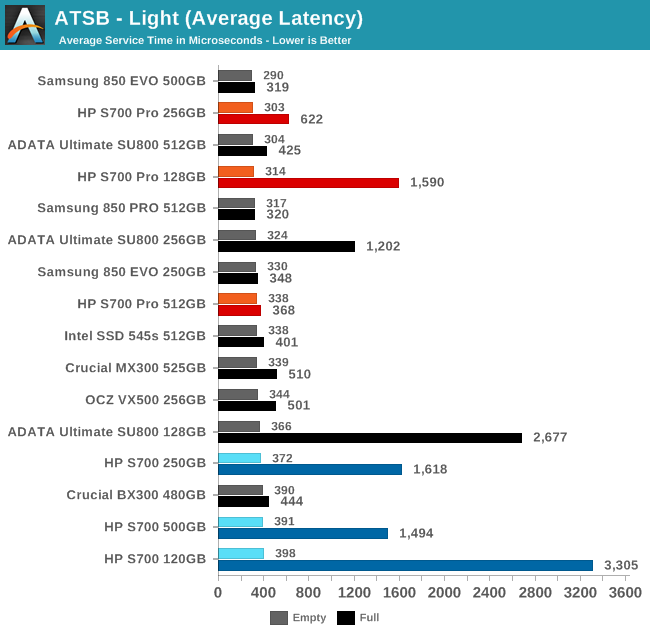
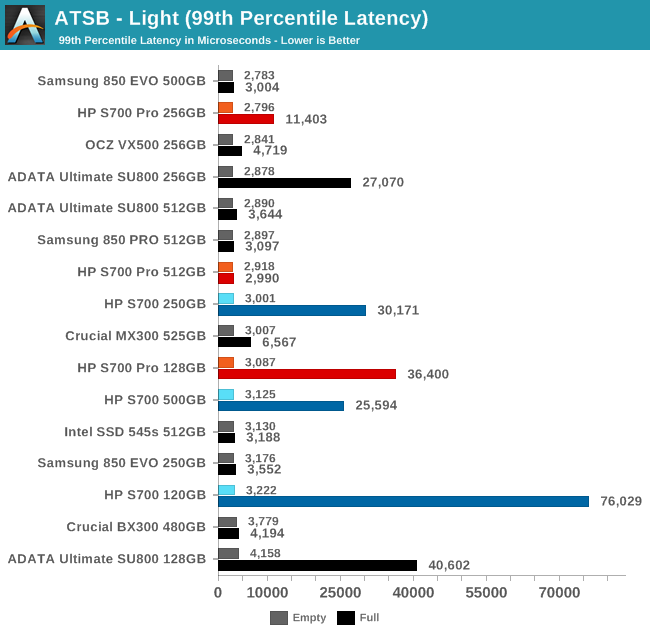
None of these drives has a problem with average latency when the Light test is run on an empty drive. The ADATA SU800, HP S700 and the smaller two capacities of the S700 Pro show much higher average latency when full, but on a test this light the worst scores are still in the low millisecond range. The 99th percentile latency scores paint a similar picture of all the drives being fine until they're full, and the 512GB S700 Pro handles being full quite well.
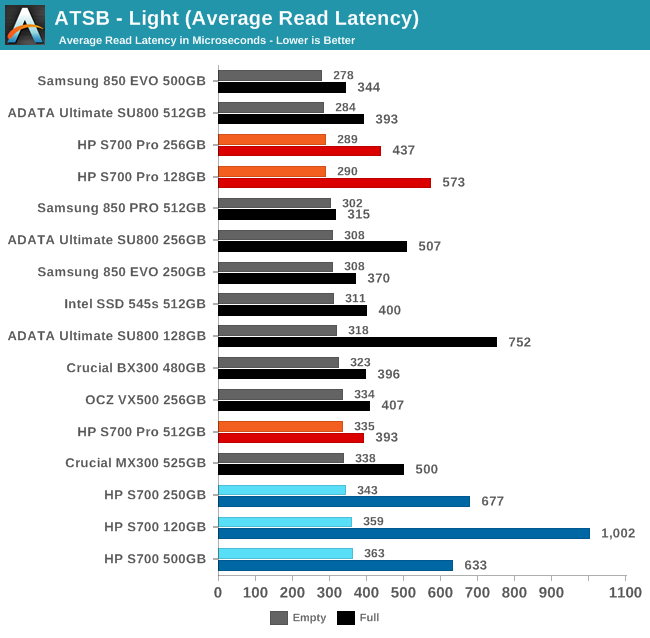
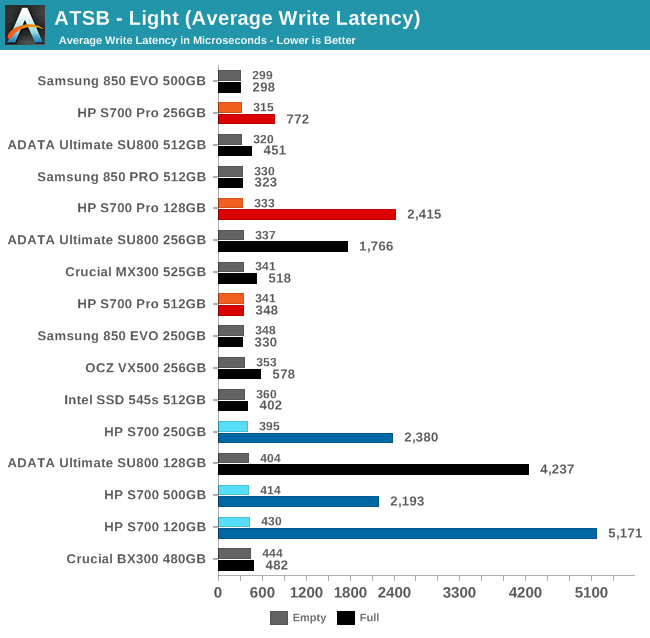
The 120GB S700 is the only drive in this bunch where average read latency exceeds 1ms when the test is run on a full drive. Average write latencies can climb to over 1ms for several drives, and the 120GB S700 breaks 5ms in the worst-case conditions for the Light test.
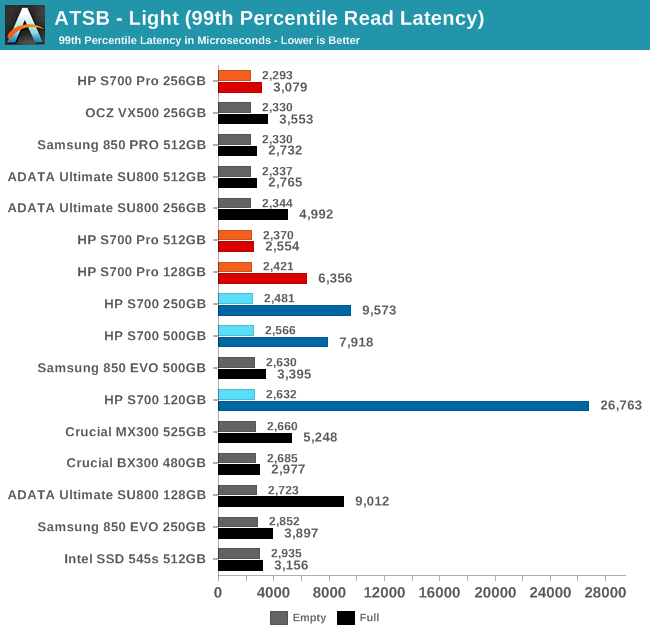
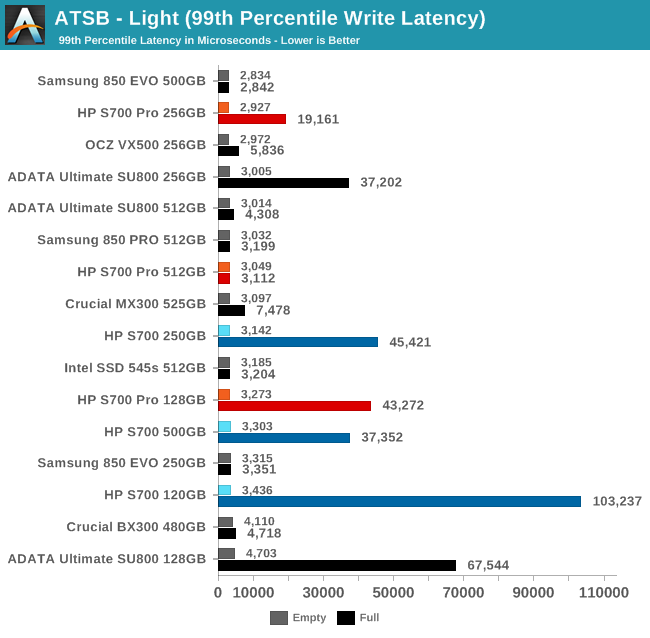
The 99th percentile read and write latencies are all in the low-millisecond range when the Light test is run on an empty drive. With the drives full, the worst case is again the 120GB S700, with thirty times higher 99th percentile write latency. But since this is still only 100ms, even this slowest drive doesn't produce noticeable pauses during ordinary use for light workloads.
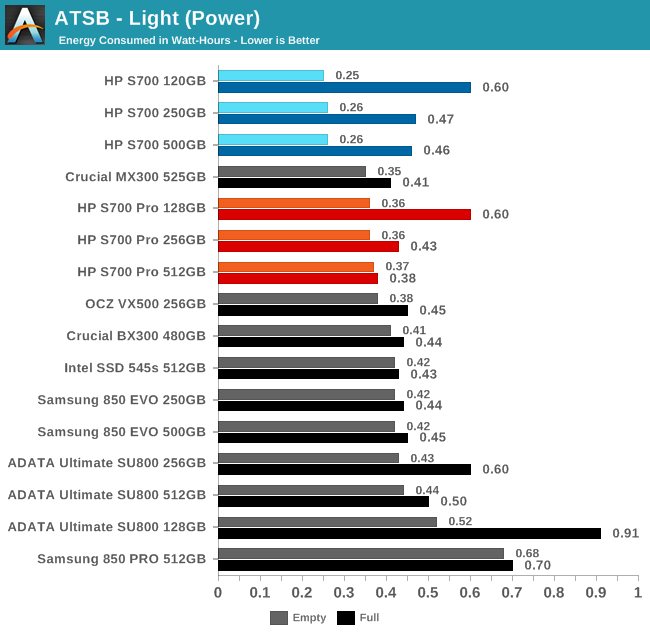
All three HP S700s top the energy efficiency charts, and the S700 Pros aren't far behind. Energy efficiency is worse when the test is run on a full drive, but the result is that the S700 Pro ends up at the top instead of the S700. Before TLC NAND took over the mainstream SSD market, Silicon Motion's controllers were known for great efficiency. HP's drives show off Silicon Motion's efficiency much better than the ADATA SU800 did.










54 Comments
View All Comments
ddriver - Thursday, September 7, 2017 - link
Why is it "Pro"? Performance - nope, endurance - nope, warranty - nope, sounds better - nailed it.HP's brand new Pro bested by Samsung's ancient Evo...
MajGenRelativity - Thursday, September 7, 2017 - link
It's better than the 700 non-Pro, so it warrants that in relation to its other counterpart.mooninite - Thursday, September 7, 2017 - link
You nailed it. Unfortunately HP will sell units because 1) they'll ship them in their own systems they sell and 2) they have blindly loyal customers.MajGenRelativity - Thursday, September 7, 2017 - link
I assume that's why HP went to the trouble of making an SSD? :Psyxbit - Thursday, September 7, 2017 - link
Making? They're not making anything here. They're repackaging another company's engineering efforts.Samus - Thursday, September 7, 2017 - link
The only blindly loyal customers out there are Lenovo's. On the whole, HP's mid-high end systems are the best on the market. Both companies...all companies, make crap at the low end. The business and professional market are where HP just destroys Lenovo is serviceability, reliability, and support. Lenovo simply wins on price. That's why people love them. Because they are cheap. And orange.sonny73n - Friday, September 8, 2017 - link
You sound spiteful. Are you hurt because Lenovo took over as the world's top ranking PC manufacturer after Q2 2013? HP has only gone downhill after that because all HP products have been made in China since who knows when.There's no company I dislike more than a domestic one with products being made overseas then shipped back and sold at home.
barleyguy - Friday, September 8, 2017 - link
You can't have your cake and eat it too. The reality is that western labor costs about 10 times as much as Chinese labor, and it's a price competitive market. If an HP laptop was built domestically, it would cost hundreds of dollars more, and most people would buy the cheaper one built in China.You either get cheap electronics or you get domestic manufacturing. At this point in time, you can't have both.
FunBunny2 - Friday, September 8, 2017 - link
-- The reality is that western labor costs about 10 times as much as Chinese laborthat made a bunch of difference years ago, but if you look at the FRED data, labor has become a vanishingly small part of production cost. if you're relying on bleeding labor to make money, you won't make much money.
Alexvrb - Sunday, September 10, 2017 - link
Exactly. Also there are lots of regions of the US where labor is cheap (rural low cost of living parts of RTW states for example). I suspect other factors such as taxes and regulation drive them to move production overseas more so than the hourly rate of workers.